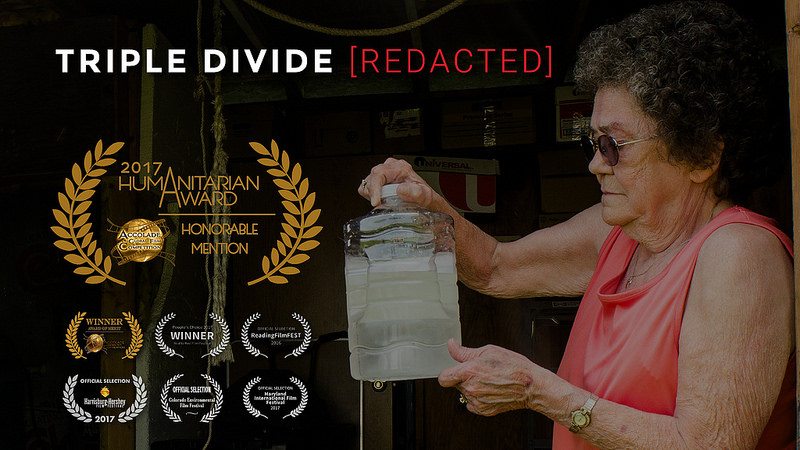A member of the Seneca Nation of Indians speaks out against a proposed fracking waste treatment facility at the headwaters of the Ohi:yo (Allegheny River) at a public meeting in Coudersport, Pennsylvania on March 26, 2018. By the end of the meeting 37 speakers provided public comment, mostly against the facility. One was denied his right to speak — over 100 were in attendance. © Joshua B. Pribanic for Public Herald
FOR IMMEDIATE RELEASE: Contact Joshua B. Pribanic and Melissa A. Troutman from Public Herald for further comment
March 28, 2018 | Press Release | Project: Smoking Gun
UPDATE: This article has been updated to include press release statements issued by the Seneca Nation of Indians
Directors of the award-winning fracking documentary, Triple Divide [Redacted] and the Seneca Nation of Indians have received cease and desist letters for slander against two companies in the fracking industry.
The targeted filmmakers, Melissa Troutman and Joshua Pribanic, are the journalists behind the investigative news nonprofit Public Herald.
“This is a baseless attempt to thwart open discussion of a controversial waste facility,” said Public Herald’s attorney Victor Pribanic, a nationally renowned trial lawyer from Pribanic & Pribanic.
The law firm Blank Rome, an oil and gas heavyweight representing Epiphany Allegheny LLC, issued slanderous statements of its own to the press accusing Pribanic and Troutman of operating outside “the laws of man, the laws of science, and the laws of God.”
The controversy surrounds a plan submitted to Pennsylvania authorities by the Pittsburgh-based Epiphany Allegheny to treat fracking wastewater and discharge effluent into the Allegheny River.
Epiphany and its CEO, Tom Joseph, has taken aim at the directors after they raised the alarm that Marcellus Shale fracking wastewater is radioactive and toxic.
Troutman and Pribanic voiced concerns about contaminants finding ways into the river, a precaution also expressed by downstream voices like the Seneca Nation of Indians, New York State Senator Catherine Young, the legislature of Cattaraugus County and several state and federal agencies.
The Pennsylvania Department of Environmental Protection (PADEP) has yet to approve Epiphany’s facility, but is expected to do so in the coming months.
In a letter to PADEP, the U.S. Army of Corp of Engineers called Epiphany’s proposal “a new technology…which USACE believes is the first of its kind in Pennsylvania” and called for “more thorough testing of ‘treated distillate’” for “pollutants of concern” including radioisotopes and benzene, both of which are known carcinogens.
Dr. John Stolz, a scientist and the Director of the Center for Environmental Research and Education at Duquesne University, shot back at Blank Rome’s statement that Pribanic and Troutman operate outside the “laws of science.”
“Locating a treatment plant for toxic waste water at the headwaters of a major river system on which millions of people, including a major midwest metropolis and the Seneca Nation, rely on for their source of drinking water and livelihood makes no sense,” Stolz said. “Melissa Troutman and Joshua Pribanic have been a bastion of sanity, diligently pursuing the facts. If they are saying something is wrong, then it warrants special attention by all parties. This attempt to silence them is an assault on the Fourth Estate.”
On March 21st, the Seneca Nation of Indians convened a government-to-government summit on the Allegany Territory and later a press conference stating its opposition to Epiphany’s proposal, citing concerns of radioactive material entering waters of the Ohi:yo (Allegheny River). Two days later, Seneca Nation President Todd Gates received a similar cease and desist letter from Blank Rome accusing the Nation of “false, destructive and defamatory statements about Epiphany.”
“The Seneca people are here to defend Mother Earth and to defend Ohi:yo’” President Gates stated in a press release from the nation. “We’ve seen the actions of other governments tear at our land, our culture and threaten our resources before. It’s happened throughout our history, from Buffalo Creek to Kinzua to Cattaraugus Creek. The river is part of our territory, just as it is part of the lives of many people from New York and Pennsylvania. We have grave concerns about the Epiphany project and will give full voice to those concerns as long as the project is under consideration. We won’t be washed away.”
The filmmakers also received a previous letter from JKLM Energy, an oil and gas company featured in Triple Divide [Redacted] for impacting the water supplies of private homes, businesses and a critical access community hospital. In 2016, JKLM Energy agreed to pay more than $470,000 in civil penalties for groundwater and drinking water contamination as a result of its drilling operations in Potter County, Pennsylvania.
JKLM is owned by billionaire Terrence “Terry” Pegula, described on Wikipedia as a “natural gas tycoon” whose assets include the Buffalo Bills, Sabres and Bandits.
“These letters are a cowardly attack in violation of Pennsylvania’s Anti-SLAPP statute,” said co-director Joshua Pribanic. “The letter from Epiphany CEO Tom Joseph and Blank Rome reads like a conspiracy theory, accusing Public Herald of running the website defendohiyo.org – we do not – and of dismissing scientific data. What scientific data? We’ve yet to see even one study about the efficacy of Epiphany’s technology at a large-scale discharge facility.”
According to Epiphany Allegheny’s permit application to PADEP, “The only remaining byproducts of the system are clean salt, and distilled water.”
JKLM’s letter to Troutman and Pribanic focuses on Epiphany’s facility, which plans to treat JKLM’s fracking waste. Attorney James Hankle writes, “the Facility neither takes in nor produces ‘toxic waste’.”
“Trying to paint fracking waste as non-toxic is deceptive and dangerous,” said co-director Melissa Troutman, a fifth-generation “european native” of Potter County.
“The Pennsylvania Medical Society called for a moratorium on fracking in 2016, partly because this industry uses and produces toxic materials. JKLM should be ashamed of portraying their waste as anything but toxic,” Troutman stated.
Dr. Tony Ingraffea, a renowned scientific expert on the subject of fracking, has also come to the filmmakers’ defense.
“‘Proof-testing’ of a process for a private company must be weighed against the risk of broader unintended consequences for everybody living downstream,” said Ingraffea, the Dwight C. Baum Professorship in Engineering at Cornell University. “Joshua Pribanic and Melissa Troutman, co-directors of TRIPLE DIVIDE [REDACTED] which highlights this wisdom, are competent and honorable spokespersons for all those downstream. Any attempt to silence them promotes a wager using house money.”
“The letters we received from JKLM Energy and Epiphany Allegheny are an attempt to silence us. That’s never going to happen,” Troutman said.
The film Triple Divide [Redacted] has won several awards, including a Humanitarian Award from the Accolade Global Film Competition in 2017.
According to Accolade, “The goal of the Humanitarian Award is to honor filmmakers who are bringing awareness to issues of ecological, political, social and spiritual importance. The winners are hand-picked by the judges and staff from hundreds of entries throughout the year.”
Triple Divide [Redacted] is available through Bullfrog Films.

![Melissa Troutman Director of Triple Divide Redacted Melissa Troutman Co-Director Of Triple Divide [Redacted]](https://publicherald.org/wp-content/uploads/bfi_thumb/Melissa-Troutman-Director-of-Triple-Divide-Redacted-nnvlh4ducuo1m564it06enejx7j7x1hyrt38u63a1s.jpg)





